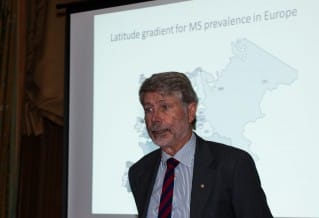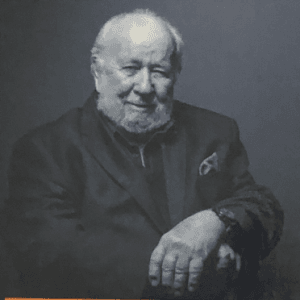
“What causes MS? The impact of the genetic revolution”
Professor Graeme Stewart AM
Wednesday, 2 July 2014
Professor Graeme Stewart AM, director of clinical immunology at Westmead Hospital, has researched the genetic influences on disease, in particular on multiple sclerosis (MS). MS is the commonest chronic neurological disorder of young at all. It usually starts with a relapsing/remitting phase (symptoms occur and then go into remission for extended periods), commonly with onset at about the age of 30. The disease can be relatively benign with periods of disability, it can present as a relapsing/remitting disease with gradual increase in disability, or in about 10-20% of patients it can present as being “primary progressive”, where disability progressively increases over time. MS is caused by the body’s immune system malfunctioning – macrophages devour the myelin sheath around nerve cells, exposing the nerve axon and thereby disrupting the flow of information along the nerve cell. The body is able to repair the damage by re-myelinating the nerve cells after this initial attack however if the myelin is attacked the second time in the same place, the body is unable to repair the sheath and relapse occurs. Hence the symptoms of the disease progress.
The important question is: what causes this? MS is a disease which is clearly influenced by genes and environment. Studies of the disease in identical twins show 30% concordance, whereas in fraternal twins there is 4% concordance. The background incidence rate of MS is 0.4% of the population. This suggests that genetic influences are very significant but environmental factors are also a consideration. The interesting environmental effect is that the incidence of MS is quite highly correlated to latitude – for example, in Australia there is a 4 to 7 times hazard ratio between North Queensland and Tasmania – in the southern hemisphere, the further south you live, the more likely you are to contract MS. The most likely reason for this is the reduced exposure to UV-B light the further you are from the equator and vitamin D deficiency. Other environmental factors include smoking and exposure to the Epstein-Barr virus that causes glandular fever (almost all MS patients have been affected with Epstein-Barr virus). The fact that Epstein-Barr virus is implicated in virtually all MS cases may present an opportunity for treatment if the effect of this virus on DNA is understood.
Since the early 1970s, there has been a search for the genes implicated in MS. The first was found in 1972 but it was not until 2007 that the second gene was identified. Since then, as a consequence of the human genome project and widespread sequencing technology, together with the recent advances in computer power and statistical algorithms to handle large amounts of data, there have been over 100 genes identified. Pursuing genetic associations is expected to give insight into the pathogenesis, in particular the interaction between genes and environment. It is hoped that this will lead to interventions to prevent the disease from progressing. In addition, identifying genetic biomarkers may provide major opportunities for new treatments, including personalised treatments based on the individuals genetic profile.
There has been substantial progress in treatments for MS, including trials of drugs to stop T cells crossing the blood-brain barrier, drugs that capture lymphocytes and hold them in the lymph nodes and early indications that drugs targeting specific proteins identified through genetic analysis might be useful. In addition, trials are underway to see whether large doses of vitamin D might have some impact and whether increased exposure to ultraviolet light might also offer some improvement.






